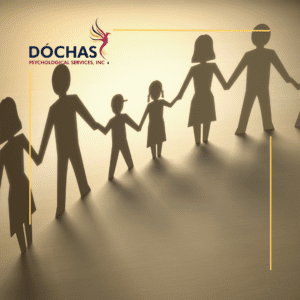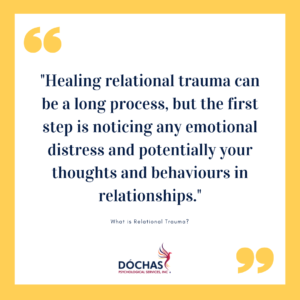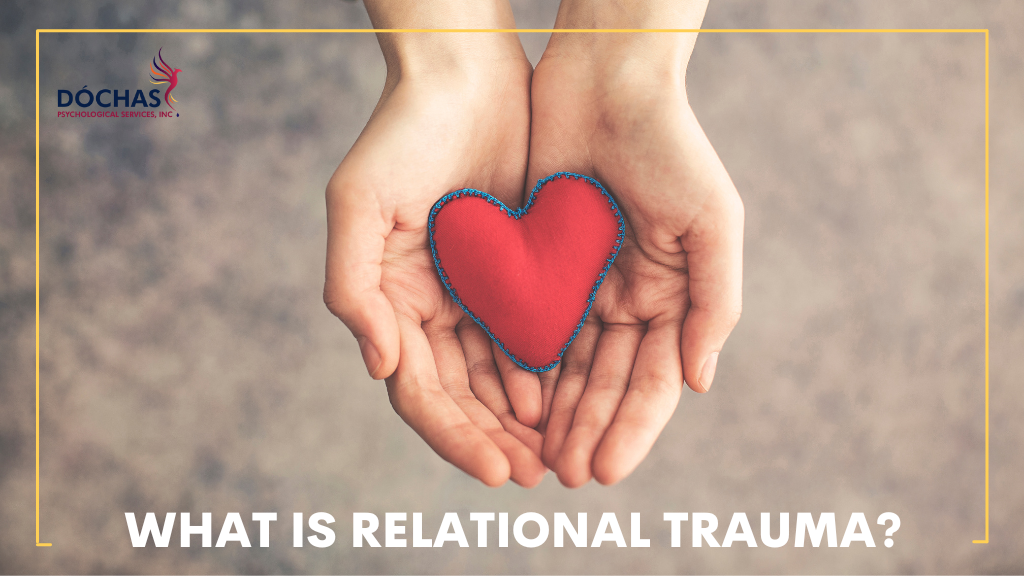Hey everyone, it’s Justine here on the Dóchas blog to talk about relational trauma. Do you or someone you know have difficulty trusting people? Do you find yourself feeling distant from friends or family? If you have experienced any kind of trauma in a close relationship, it can cause you to want to shut yourself out from the world. This is called “relational trauma.” Relational trauma describes the aftermath of abuse, neglect, maltreatment, or abandonment within a relationship(s). I want to walk you through the kinds of impacts and symptoms that tend to stem from relational trauma and talk about some suggested processes for healing.
Impacts and Symptoms of Relational Trauma
Let’s talk about some of the impacts and symptoms. Relational trauma, especially experienced from a young age, impacts a person’s attachment style, which describes the pattern of behaviours a person has in their relationships. Suppose you’ve experienced abuse in a significant relationship, you may notice that you tend to be fearful of mistreatment. You probably find that you have difficulty opening up to others because you fear they won’t accept you. You may notice that you become overly pleasing in relationships despite experiencing maltreatment. You may also experience enmeshment in your close relationships. What is enmeshment? It’s a term used to describe the blurring of boundaries or reversal of roles most commonly found in familial relationships. You may feel responsible for a parent’s emotional well-being or feel like you are a parent rather than a child due to the blurring of boundaries or roles within the relationship(s).

Common ways that relational trauma symptoms are expressed:
- Over-dependence on others, neediness, or attention-seeking behaviour
- Mistrust of others
- Hostility, anger, rage, or bouts of sadness when emotionally “triggered”
- Recurrent flashbacks and emotional “triggers” (i.e. things that remind you of the person or the abuse)
- Difficulty trusting others
- Low sense of self-worth
- Avoidance of people, places, or situations of their traumatic experience
- Reduced mental health and mental health conditions such as depression, anxiety, PTSD, attachment disorders, and other conditions
Starting the Healing Process
Healing relational trauma can be a long process, but the first step is noticing any emotional distress and potentially your thoughts and behaviours in relationships. This can be hard to think about! Just know that recognizing the impacts of relational trauma allows you to communicate with others in your relationships so they can understand and support you. You can also learn to develop new and healthier patterns of interactions and behaviours with yourself and in your relationships. If you carry the fear of betrayal or abandonment from your childhood or a significant relationship in your past relationships, recognize this fear and how it impacts your behaviours and then change these behaviours so that you can begin to experience trusting and secure connections with others.

If you’ve experienced abuse or neglect in your past or current relationships, noticing the impacts that the relational trauma may have on your mental health and behaviours can be a powerful tool for creating change. If you require assistance in your healing journey, there is no shame in seeking support. I encourage you to reach out and ask us how we can help. You can reach out to us here by calling us at 780-446-0300 or emailing info@dochaspsychologicalservices.com.
About Dóchas Psychological
Dóchas Psychological Services is a well-established and trusted therapy clinic located in Spruce Grove, Alberta. At Dóchas we value the idea that everyone deserves a safe space. Through connection and education, our team works hard to build a trustworthy relationship with each of our clients. It is our goal to create a community for our clients to feel like they belong.
Disclaimer
Information provided through Dóchas Psychological Services blogs or vlogs is meant for educational purposes only. They are NOT medical or mental health advice. You can read more about our disclaimer here.

